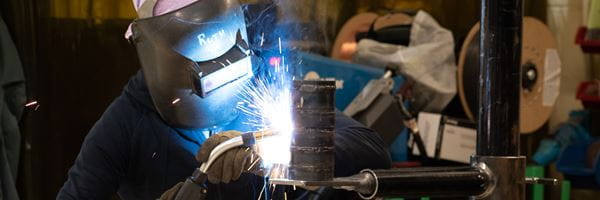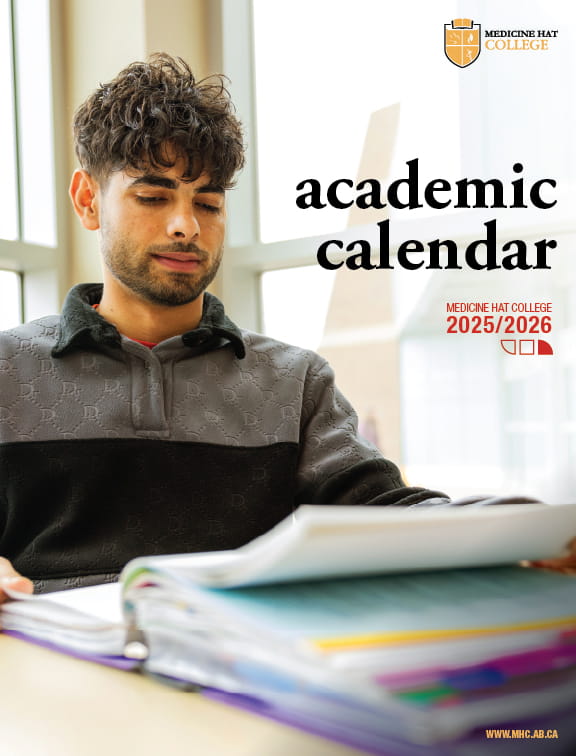Earn your apprenticeship certificate at Medicine Hat College
Apprenticeship is a great way to develop employable skills while working and earning a paycheck. In fact, apprentices are required to find a job before they go to school.
On the job, you’ll typically work under the direction of a journeyperson who provides instruction as you gain experience. Your college study periods are short, usually about two months long, allowing you to build theoretical knowledge and more advanced practical skills. Apprenticeship programs require you to attend college once a year for three or four years.
Electricians install, alter, repair, and maintain electrical systems designed to provide heat, light, power, control, signal or fire alarms for all types of buildings, structures, and premises. Your jobs might include:
- reading and interpreting electrical, mechanical and architectural drawings and electrical code specifications to determine wiring layouts
- cutting, threading, bending, assembling and installing conduits and other types of electrical conductor enclosures and fittings
- pulling wire through conduits and holes in walls and floors
- positioning, maintaining and installing distribution and control equipment such as switches, relays, circuit breaker panels and fuse enclosures
- installing data cabling or fibre optic systems
- testing circuits to ensure integrity and safety
- working with photovoltaic renewable electrical energies
Some electricians specialize in specific types of installations such as:
- residential (housing developments)
- commercial (office buildings)
- institutional (hospitals)
- industrial (plants, factories)
Your work may be involved with construction or maintenance, or a variety of electrical work. Electricians usually work a 40-hour, five-day week plus overtime when required. Especially in construction, there may be no guarantee of permanent work. Working conditions can change dramatically from one job to another, varying from indoors in clean conditions to outdoors on scaffolding, to indoors in cramped conditions.
The first step to becoming an apprentice is finding a job in the trade you would like to study. This is like any other job search, except you are looking for an employer who is willing to hire you as an apprentice in a trade. Once you have found employment, you can complete the Apprenticeship Application and Contract. This will allow you to be accepted as an apprentice tradesperson. Access the form at www.tradesecrets.alberta.ca.
After your application has been accepted, you will begin training with your employer and are now eligible to register for training at Medicine Hat College. You will then be sent an information package from the college on how to proceed with your registration.
Apprenticeship Contracts
You and your employer will sign a contract. Before signing the contract, read it carefully to know your obligations and responsibilities and those of your employer. Once signed, the contract must be delivered to Apprenticeship and Industry Training. An identification card, course outline booklet and, for most trades, an apprenticeship record book are issued to you. At this point, your apprenticeship training begins.
Attending Technical Training Classes
A notice to attend technical training will be sent about two months before classes begin. Class schedules are posted at www.tradesecrets.alberta.ca. Registration for your technical training must be arranged through Medicine Hat College in the appropriate trades program.
Electricians work for construction and maintenance contractors, manufacturers, resource companies, and other large organizations. Electricians in the construction industry may experience layoffs between projects and when the industry is in a slump. They must be willing to go where the work exists. Membership in a trade union is voluntary; however, some contractors employ only union people.
Journeyperson wage rates vary, but generally range from $25 to $40 an hour plus benefits.
Electricians may advance to positions such as foreman, superintendent, estimator or electrical inspector. Some electricians start their own contracting businesses.
In Alberta, a valid Master Electrician Identification Number is required in order to pull electrical work permits. Alberta-certified electricians may apply to the Electrical Contractors Association of Alberta to become Master Electricians (see www.ecaa.ab.ca) after three years of becoming certified.
Additional Information
You will be awarded an Alberta Completion of Apprenticeship Certificate when you successfully complete all requirements of your apprenticeship contract. In addition to and depending on the trade, you will receive a Journeyperson certification.
Trades eligible for an Interprovincial Red Seal Certificate have an additional exam to write and upon successful completion of the exam, the seal is affixed to the Journeyperson certificate when issued.
In the province of Alberta, there are two kinds of regulated trades.
- Compulsory Certification Must be either a journeyperson or apprentice to work in the trade as legislated under the Alberta Industry and Training Act.
- Optional Certification Trades training is offered but optional.
Promotion Requirements
You must write an Apprenticeship and Trade Certification exam at the end of each technical training class. The passing mark is 70%. If you do not pass, you may be offered an apprenticeship supplemental exam. You must take the course again if you do not pass the supplemental exam.
To progress from one training period to the next and get a wage increase, you must
- pass the apprenticeship exam.
- receive an acceptable mark in the course.
- obtain the required number of hours of work experience.
- receive a satisfactory report from your employer.
Looking for ways to help fund your education?
There are lots of options like student loans, scholarships, bursaries and emergency funding available.
Check out our FINANCIAL AID page for more information.
At MHC, we care about students and want to help you succeed.
As a student, there may be times when you require support. Our SERVICES page provides you with links to a number of campus supports including academic success, counselling and care, health and wellness, and many other resources.







